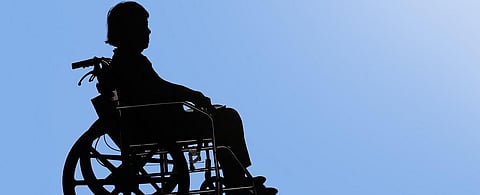Menstrual Hygiene Day: If healthy women have problems, what about the differently-abled?
If able-bodied women find menstruation a challenge, what about those who are deaf and mute, blind and physically handicapped? This thought broke into multiple questions and it was unfortunate that this had never been seen as a severe issue before.
But, addressing this issue in such a group is challenging as they feel awkward and don’t respond well. Also, it’s not advisable to have one common general method to interact with the three different groups — deaf and mute, blind and physically handicapped. The medium and method of communication must be developed uniquely for every disability as each has its unique set of problems related to communication, infrastructure and product usage.
When it comes to communication, interacting with the deaf and mute women and being able to convey information accurately is a tough task. It could be dangerous too if they interpret the information incorrectly and follow wrong practices. To bridge this gap, training a partially deaf-mute candidate, who can further train others, could prove helpful.
In case of infrastructure, women with different disabilities face different issues. A blind girl after urinating couldn't flush the toilet totally clean and handicapped girls have to come crawling on the floor to use unclean toilets. This shows how infrastructure design is an inevitable part of menstrual hygiene.
Another issue is that women with such disabilities have problems using and understanding regular menstrual products. The handicapped women, who have to crawl on the ground, are constantly worried about the pad slipping out. This made them wear very tight layers of clothing, which is not advisable in high temperatures.
In some cases, women also use safety pins to pin-up the pad to their underwear which can cause injuries. Visually impaired women often put the pad upside down, keeping the sticky side up, that causes them pain and discomfort.
I came across all these problems while managing Anandwan, a shelter for around 2,500 differently-abled people that provides them with primary and secondary healthcare facilities, housing, food, clothing, education and vocational skills training. Since these problems are much more severe than previously thought, how are those differently-abled women handling it who do not have access to all amenities.
Maharogi Sewa Samiti, a non-profit, conducted a survey in Maharashtra to know how others deal with the problems of communication, infrastructure and product usage.
The survey showed girls, who have a combination of mental and physical challenges, were facing problems that are more severe than those who were disabled. They were categorised as mentally retarded based on intelligence quotient and those with severe mental retardation (MR) have zero understanding of the body changes they go through.
A 16-year-old severe MR patient has a brain of a two-year-old and that makes it almost impossible for her to understand what periods are. How can she understand why she is bleeding? How must she face the hormonal changes during puberty?
Similarly, girls with cerebral palsy (CP) face major challenges when it comes to period hygiene. Symptoms of CP include poor coordination, stiff muscles, weak muscles and tremors. Such patients totally depend on another person for day-to-day activities.
The surveyors also saw patients who had MR and CP both. A woman whose daughter is such a patient told the surveyors, “I am a house help and have two daughters who are mentally retarded. My husband is a drunkard and my one daughter just got her first period. It is becoming difficult for me to handle this situation on a day-to-day basis. She is undergoing mental trauma due to these body changes. Can we remove her uterus to save her from this distress?”
It’s difficult to understand if she needs to be told about human rights or empathised with.
A few parents were also concerned about their daughters’ safety as these girls do not understand what is happening with them and they do not understand when someone tries to rape or molest them. Several times, rape cases are only identified when the girl is found to be pregnant. Another woman whose daughter is mentally retarded said, “It would be better if my daughter dies before I do. I am not sure if she will be taken care of after me.”
The surveyors also found that organisations helping or sheltering people with disabilities had hired women to maintain their personal hygiene. But the patients were not comfortable with them. While they were anyway unable to accept menstruation, they were even more embarrassed and annoyed about a woman not close to them trying to help them. But, if their mothers were trained about menstrual hygiene and they helped the patients, the girls were found to be calmer and more accepting. This gives way to another issue: what about orphan girls who have MR and CP?
Maintaining menstrual health, hygiene and practices for all these women and their families is challenging. It’s an unending uphill struggle for which people require a lot of mental and physical support. Our society needs many more hands to come together and work in this direction with sensitivity and acceptance. We must first empathise with the ones in pain to even think about a solution.
(The author is the director-programs for Strissue, an initiative by Maharogi Sewa Samiti to design effective measures for menstrual health management)


